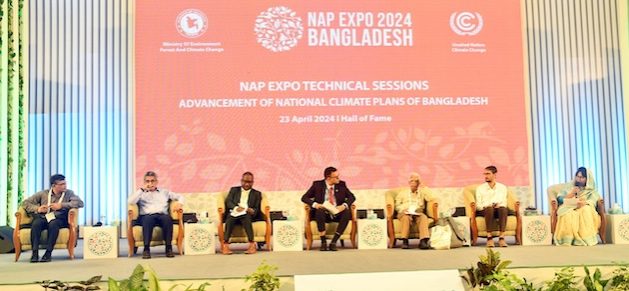LDCs Need Concessional Grants, Not Loans, Say Experts

DHAKA, May 06 (IPS) - Olaide Bankole was born and raised in Nigeria, and he observed how climate change was evident in the country with temperature rises and rainfall variability and how drought, desertification, and sea level rises have been affecting its people.
He is also aware of how rising sea levels threaten southern Nigerian cities like Lagos and coastal areas, increasing their vulnerability to flooding and waterborne diseases.
Bankole, who is now working as a policy analyst at the International Institute for Sustainable Development (IISD) in Canada, joined the National Adaptation Plan (NAP) Expo 2024 held recently in Dhaka to gain and share knowledge on NAP formulation.
In an interview with IPS on the sidelines of the conference, he said the available fund for climate change adaptation is not nearly enough.
In 2009, the IISD policy analyst said the developed countries promised that by 2020, billions of dollars a year would be given to poorer nations hit hard by worsening climate-fueled disasters.
“The developed countries promised USD 100 billion a year but they did not make good on such promises," he said.
Bangladesh alone needed USD 230 billion to implement its NAP.
"Firstly, the developed countries must keep their promises and must meet at least the target of USD 100 billion. And then we can go for other funding. There is a process of funding and private sector finance and other finance windows can be assessed. But the progress is too slow, so we need to move fast, which is the topic of this NAP Expo—transformative adaptation,” Bankole told IPS.
Already, he said, many countries are in debt traps because of the loans they took from various lenders like the World Bank and the International Monetary Fund (IMF).
“The money they are receiving for climate change adaptation should not be a loan facility. It should be concessional grants. These countries have already taken loans for their development, while the loans received to deal with climate change impacts will enhance their financial burden. So, I think the fund should not be loans; it should be concessional grants," said Bankole.
Talking to IPS on the sidelines, Malik Fida A Khan, a panelist at NAP Expo 2024, said around 600 delegates and representatives from 104 countries participated in the adaptation meet and discussed the process of NAP formulation and finance in climate adaptation.
“Bangladesh requires USD 8.5 billion per year to implement the National Adaptation Plan (NAP) it adopted to cope with climate change impacts and we have been pushing the development partners to provide concessional loans,” he mentioned.
Fida A. Khan, Executive Director of the Dhaka-based think tank Center for Environmental and Geographic Information Services (CEGIS), said adaptation on its own will not work in addressing climate change impacts in Bangladesh after 2026, so carrying out mitigation programmes will be needed.
He too referred to the unmet promise from the developed nations to provide USD 100 billion per year to the climate-vulnerable countries by 2020.
“We have always been demanding grants, not loans, from the developed countries, which are responsible for global warning. If they are not able to provide a huge amount of grants to the Least Developed Countries (LDCs), which are highly vulnerable to economic and environmental shocks, they should provide concessional loans to these countries with a lower interest rate that will not exceed one percent,” he said.
Speaking on the inaugural day of the four-day NAP Expo 2024 on April 22, Bangladesh Minister for Environment, Forestry, and Climate Change, Saber Hossain Chowdhury, said Bangladesh had achieved remarkable progress in addressing climate change despite the manifold impacts of climate change on the country and its people.
He said that because of the unmet USD 100 billion pledge, an agreed definition of climate finance must be a definitive outcome of COP29, which will have a focus on finance, including the New Collective Quantified Goals. These goals will consider the increasing needs of climate-vulnerable countries, small island developing states and, of course, the LDCs.
Chowdhury said: “Time itself is running out; we need to restore global trust and solidarity and ensure that the United Nations Framework Convention on Climate Change (UNFCCC) as a global process delivers on its objectives and commitments and the National Adaptation Plan will continue to be an important pillar in this regard.”
The four-day UN Climate Adaptation Conference National Adaptation Plan (NAP) Expo 2024 was held at Bangabandhu International Conference Centre (BICC) in Dhaka in April.
Prime Minister Sheikh Hasina inaugurated the conference.
IPS UN Bureau Report
Follow @IPSNewsUNBureau
Follow IPS News UN Bureau on Instagram
© Inter Press Service (2024) — All Rights Reserved. Original source: Inter Press Service
 Global Issues
Global Issues